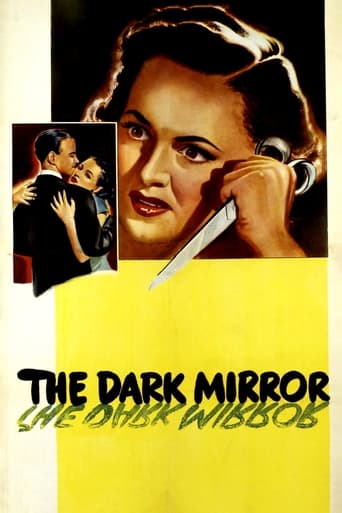moonspinner55
Psychologist works with the police in determining which of two sisters committed a murder--the trouble is, the ladies are identical twins, with one sibling apparently covering up for the other. Good optical effects and editing can't quite make this scenario convincing, particularly as Olivia de Havilland is wide-eyed and artificial in both her incarnations; the histrionic schlock music rising up in the background doesn't help, either. Director Robert Siodmak's work is hit-and-miss: he handles doctor Lew Ayres' investigation scenes well, however the opening interviews in the police station are awfully corny. Nunnally Johnson adapted his screenplay from an original story by Vladimir Pozner (who alone was Oscar-nominated). The plot builds to a melodramatic boil, yet the final tally isn't all that intriguing. ** from ****
kijii
The magic here is trying to play two identical twins. Ultimately, Bette Davis did it at least twice. I'm sure de Havilland wanted to do it too. It is a challenge. For the viewer, one must pay careful attention to which one is which--- and when we know who is who---and how we figure it out. I can tell you that the twins names were Terry and Ruth, but "which is which" can only be deducted after seeing the entire movie. Another problem with the movie is Lew Ayres role. Did he actually love one of them or was that part of the rouse to discover their identity. The former would be highly unethical, in fact both may be unethical if it weren't a movie--but it is only a m-o-v-ie.
dstanwyck
I love 1940's melodramas in general, let alone pseudo psychological studies. Speaking of breaking confidentialities! And simplistic diagnostic evaluations. Oh, well - nevertheless it was fun seeing Olivia torment herself at every turn. Probably wishing it were Joan playing opposite her. The questioning of the witnesses in the beginning had some nice characters playing their parts with an air of rightness. Olivia is a bit cloying at times in any of her movies when she is emphasizing the sweet side of her nature rather than just trusting her innate nice self. And when she goes evil, she can pull that off as well, letting that side come out. Thomas Mitchell as often as not can walk away with a movie and he went in that direction here. A little too claustrophobic even with their being many different settings. I like Robert Siodmak's directorial decisions in all of his movies and Nunnally Johnson writes good scripts as a rule. This one was of its time and sounds pretty naive now. But it is fun and nice way of showing both of them, the 2 Olivia's in the same shot vying for screen time. Get some popcorn, stretch out and enjoy yourself.
Spikeopath
The Dark Mirror is directed by Robert Siodmak and adapted to screenplay by Nunnally Johnson from a story by Vladimir Pozner. It stars Olivia de Havilland, Lew Ayres, Thomas Mitchell, Richard Long and Charles Evans. Music is by Dimitri Tiomkin and cinematography by Milton Krasner.A man appears to have been murdered by one of the identical twin Collins sisters, but both of whom have an alibi. The police and the psychiatrist have their work cut out...Straight out of the corner of postwar Hollywood that began to take fascination with mental illness, The Dark Mirror triumphs more as a technical exercise than as anything resembling thought provoking analysis. The simplistic Freudian elements aside, film is impressively mounted and performed by Siodmak and de Havilland respectively. Story follows the trajectory of a cat-and-mouse game, with the makers nicely putting us the viewers into the same struggle the authorities have in sussing out which sister is the damaged killer.Siodmak's (The Spiral Staircase) attention to detail and grasp of mood setting really lifts the piece to greater heights. Aided by the considerable photographic skills of Krasner (The Set-Up), Siodmak creates a world of psychological disturbance, a place aligned with suspense and symbolism. Right from the doozy of an opening scene to the denouement, Siodmak manages to keep the contrivances to the rear of the play and let de Havilland and the visual textures be the prime focus.The effects work is very good, with de Havilland having to quite often play off against herself. Sure in today's age of High Definition et al, you don't have to stretch your viewing experience to see how the effects were done, but why would you? Just enjoy de Havillland's riveting performances in the dual roles (see also her excellence in The Snake Pit two years later), her skillful little subtleties as she deftly plays out the respective psychological traits of sibling rivalry gone astray.Is it a gimmick movie? Well no not really, it's honest about what it wants to achieve in terms of psychiatric observations and treatments. Yet lesser lights than Siodmak, Krasner and de Havilland would have struggled to make it work, especially as the romance angle in the screenplay nearly derails the requisite mood come the finale. Thankfully, in spite of some obvious negatives, it's still well worthy of viewing investment. 7/10


